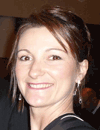Catherine Alix-Panabieres, Associate Professor, University Medical Center of MontpellierDr Catherine Alix-Panabières received her PhD degree in 1998 at the Institute of Virology, University Louis Pasteur, in Strasbourg (France). In 1999, she moved to Montpellier where she did a postdoctoral research in the Department of Immuno-Virology of the University Medical Centre of Montpellier, France. During this last decade, Dr Alix-Panabières has focused on optimizing new techniques of enrichment and detection of viable disseminating tumour cells in patients with solid tumors. She is the expert for the EPISPOT technology which is used to detect viable tumor cells in the peripheral blood and the bone marrow of patients with breast, prostate and colon cancer. She is an associate-professor in the Laboratory of Cellular and Hormonal Biology at the University Medical Center of Montpellier and recently, she built a new laboratory (Laboratory of Rare Human Circulating cells - Institute of Research in Biotherapy – University Medical Centre Montpellier, France, http://irb.chu-montpellier.fr/index.html). Responsible of the Cancer Research department, they isolate, detect and characterize CTC/DTC using combination of the EPISPOT assay, the CellSearch® system (Veridex) and the last generation of a high tech flow cytometer (MoFlo-Astrios - Beckmann Coulter). She has authored or co-authored 25 scientific publications in this field during the last 5 years including 9 book chapters. |  | | | Klaus Pantel, Professor and Founding Director, University Of HamburgProf. Klaus Pantel graduated in 1986 from Cologne University in Germany and completed his thesis on mathematical modelling of hematopoiesis in 1987. After his postdoctoral period in the USA on hematopoietic stem cell regulation (Wayne State University, Detroit), he performed research on cancer micrometastasis at the Institute of Immunology, University of Munich for 10 years. Currently, Prof Pantel is Chairman of the Institute of Tumour Biology at the University Medical Center Hamburg-Eppendorf. The institute is part of the University Cancer Center Hamburg (UCCH). The pioneer work of Prof Pantel in the field of cancer micrometastasis, circulating tumor cells and circulating nucleic acids (ctDNA, microRNAs) is reflected by more than 300 publications in excellent high ranking biomedical and scientific journals (incl. NEJM, Lancet, Nature Journals, Cancer Cell, PNAS, JCO, JNCI, Cancer Res.) and has been awarded recently (AACR Outstanding Investigator Award 2010, German Cancer Award 2010, ERC Advanced Investigator Grant 2011). Moreover, Prof Pantel was co-ordinator of the FP6 EU STREP “DISMAL” (Disseminated Malignancies, www.dismal-project.eu), coordinates now the European TRANSCAN group “CTC-SCAN” and the EU IMI Network Project “CANCER-ID” (www.cancer-id.eu) and serves on the Editorial Boards of international cancer journals (e.g., Clin. Cancer Res., Breast Cancer Res., Cancer Res.). |  | | |
|
